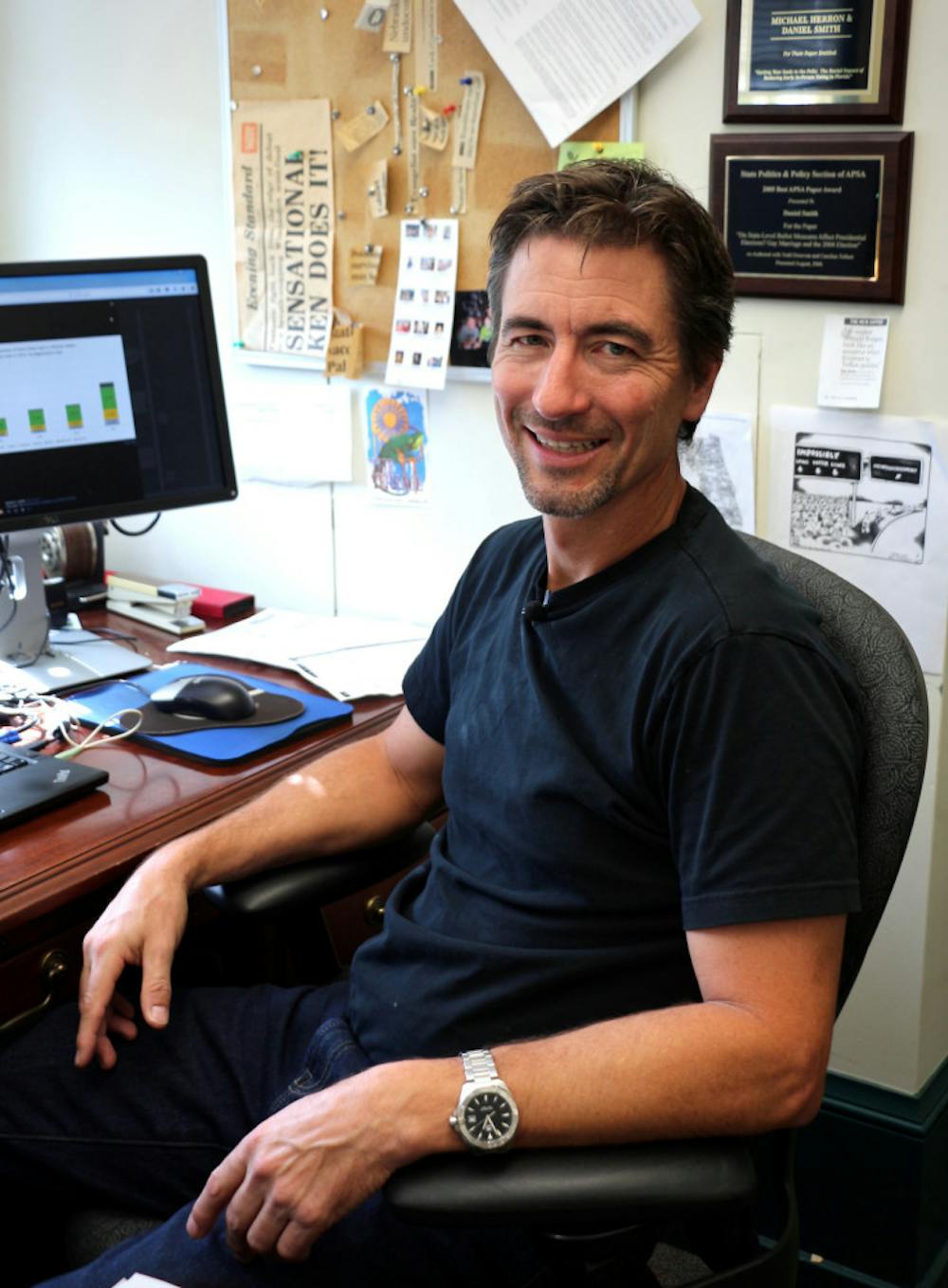It was a package of information that arrived in his mailbox Saturday that got Daniel Smith out of bed at 4 a.m., just a few hours after he went to sleep.
The package contained data on the number of Hispanic early voters in Florida. By 8 a.m., after posting the highly coveted information online, the UF political science professor was on the phone with reporters from The New York Times and The Miami Herald.
“I’ve always been a skeptic who is very critical, and I just happen to turn my attention to politics,” said Smith, who alone has been quoted more than 500 times by news outlets regarding his voting analysis.
Smith, 50, along with his colleague, UF professor Michael McDonald, has become a leader in the political sphere during this year’s presidential election. Together, they have a team of undergraduate and graduate students who help compile information ranging from voter-registration data to early voting data.
Leading up to the election, they’ve put out more than hundreds of statistics about early voters in Florida and the rest of the country. On their individual websites, ElectionSmith and Election Project, respectively, information is updated almost constantly.
Even if it means losing sleep as he balances his job with his passion, Smith said he feels responsible to help put out accurate information about voting data.
“There just aren’t a lot of people who do what I do, so I kind of feel like I have an obligation,” he said.
• • •
Smith grew up with politics in his blood.
His mother ran for office in his hometown in Pennsylvania. In the 1980s, his grandmother became mayor of Longboat Key, a town on Florida’s west coast, he said.
His father’s career as an academic led Smith to become more critical of politicians. Despite growing up surrounded by politicians, Smith said he could never see himself becoming one.
To be able to work for a politician, “you kind of have to be a believer and drink the Kool-Aid,” he said.
After graduating from Pennsylvania State University with a bachelor’s degree in political science and history, he received his master’s and Ph.D. from the University of Wisconsin-Madison. By the time he joined UF’s faculty in 2010, he had already spent time analyzing politics abroad in Ghana as a Senior Fulbright Scholar.
Pedro Otalora, 20, is part of a group of undergraduate and graduate students working with Smith and McDonald to compile information to create a national voter file.
“We’ve been putting out some very interesting information that no one else is doing,” the UF political science and business junior said.
Through public records requests, the goal of the project is to create a national voter file, which will have information regarding registered voters, he said. The process of collecting the basic information from registered voters will help researchers look for cases in which voter suppression may happen.
“If the public doesn’t have access to these public records, there’s no way to hold public officials accountable,” Otalora said.
Wendy Serra, 21, has worked with Smith for most of her college career.
The UF political science and English senior said she’s been able to begin identifying the small injustices in the voting system through working with him.
“He’s the election authority in Florida, and he happens to work here at the University of Florida,” Serra said. “We need professors like him that are really passionate about what they do.”
By allowing his students to be part of the data collection, Smith said he’s able to bring real-world politics into the classroom.
“I love what I do,” he said. “I’m a better teacher and I’m a better scholar because I actually care about the implications of the questions that I’m asking, and the questions I’m asking are driven by real-world politics.”
• • •
On Oct. 6, Smith took to Twitter to call out Florida Gov. Rick Scott.
After Scott refused to extend the voter-registration deadline following Hurricane Matthew, Smith told him about how the last five days of 2012’s voter registration had about 50,000 new voters.
“Shame on @FLGovScott for not extending Oct 11 voter reg deadline; doing so would’ve allowed FL to focus on #Matthew right now; VR could wait” he wrote after tweeting about 2012 presidential election voter-registration statistics.
The tweets were picked up by news outlets, and soon, a legal case against Scott and state officials challenged the decision. Smith provided data that proved extending the deadline would allow those who were forced to evacuate a chance to register.
“It seemed like the right thing to do, and I happen to have data to be able to make that case,” he said.
• • •
For the past 10 days, Smith has averaged four-and-a-half hours of sleep a night, spending about 16 hours a day collecting, translating and putting out information on his blog.
Despite years of experience, he said the 2016 presidential election has been like nothing he’s ever seen.
“I’ve gone 25 years of avoiding reality TV, and now I’m subjected to it every day as part of this 2016 presidential campaign,” he said with a sigh, “and it pains me.”
Daniel Smith, a UF political science professor, poses for a picture in his office. Along with another professor, he has collected and made voting data publicly available in Florida for the upcoming election.






